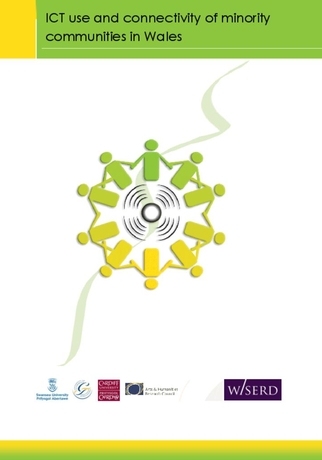Researchers from the Wales Institute of Social & Economic Research, Data & Methods, Swansea University, Cardiff University, and the University of Glamorgan will conduct a systematic research review in order to gain an understanding of the impact of Information and Communication Technologies (ICTs) on changing cultures and patterns of connectivity within and between minority communities and the potential of multifaceted digital divides in constraining or shaping these forms of connectivity in Wales.
The researchers would like to thank the Arts and Humanities Research Council for funding and supporting this research through the AHRC Connected Communities Programme. For more information on this Programme, click here.
Aims
The overall aim of the project was to gain an understanding of the impact of Information and Communication Technologies (ICTs) on changing cultures and patterns of connectivity within and between minority communities and the potential of multifaceted digital divides in constraining or shaping these forms of connectivity in Wales.
The project had the following objectives:
- To provide a systematic analysis of regional research data and findings concerning the impact of ICTs on various dimensions of minority communities’ connectivity in Wales
- To enhance our understanding of community connectivity and minority groups and the role of ICTs in general
- To address key gaps within existing research, while providing conceptual and methodological insights which can lead to large-scale, community-oriented and methodologically innovative research in Wales and across the UK
- To make recommendations about how research can connect with communities and stakeholders to enhance research and inform policy
- To provide the foundation for a systematic comparative analysis of government interventions on digital exclusion across the UK
Planned Outputs
- Planned research activities (initial report) (Month 1)
- Literature review (interim report) (Month 4)
- Policy briefing paper (Month 8)
- Methodology briefing paper (Month 8)
- Research results (final report (Month 9)
- Press release (Month 9 )
- Conference papers and journal articles (Month 9-12)
Advisory Board
The research team was supported by an expert advisory group made up of both academics and stakeholders. The group was be consulted at key stages of the research to provide expert knowledge and experience in researching the potential impacts of ICT on communities and specifically the significance of ICT use for connectivity within and between minority communities in Wales.
Professor Paul Beynon-Davies
Cardiff Business School
Cardiff University
Aberconway Building, Colum Drive
Cardiff, CF10 3EU
United Kingdom
Direct Line: + 44 (0) 29 2087 6005
Fax: + 44 (0) 29 2087 455
Email: beynon-daviesp@cardiff.ac.uk
Dr Daniel Cunliffe
Department of Computing and Mathematical Sciences / The Computing and Minority Languages Group
Faculty of Advanced Technology
University of Glamorgan
Pontypridd, CF37 1DL
United Kingdom
Phone: +44 (0)1443 483694
Fax: +44 (0)1443 482169
Email: djcunlif@glam.ac.uk
Dr David Owen
Institute for Employment Research and Centre for Research in Ethnic Relations
University of Warwick
Coventry, CV4 7AL
United Kingdom
Phone: +44(0)24-7652-4259
Fax: +44(0)24-7652-4324
e-mail: D.W.Owen@warwick.ac.uk
Resources
This Page contains links to the resources generated and used by this connected communities research project.
Here you can find a database of existing research on ICTs and community connectivity in Wales. This database is updated and enriched throughout the duration of the project.
| Research Output Title | Year |
| Accessing the internet at home | 2006 |
| Adults’ Media Literacy in the Nations: Summary report 2010 | 2010 |
| Adults’ media literacy in the nations: Summary report 2011 | 2011 |
| Atkins Broadband Report: Benefits of Broadband and the Broadband Wales Programme to the Welsh Economy | 2006 |
| Bevan Foundation Report 2011 – Digital by Default? Online public services and digital inclusion in Wales | 2011 |
| Broadband Stakeholder Group (BSG) submission to Welsh Affairs Select Committee on Digital Inclusion in Wales | 2009 |
| Capital City surfers are most confident online buyers | 2009 |
| Children’s Media Literacy in the Nations: Summary report 2010 | 2010 |
| Children’s media literacy in the nations: Summary report 2011 | 2011 |
| Communications Consumer Panel: Digital Participation Research Review 2010 | 2010 |
| Bevan Foundation Report 2011 – Digital by Default? Online public services and digital inclusion in Wales | 2011 |
| Broadband Stakeholder Group (BSG) submission to Welsh Affairs Select Committee on Digital Inclusion in Wales | 2009 |
| Communications Consumer Panel: Local Initiatives on Next Generation Access in the UK | 2009 |
| Communications Consumer Panel: Not online, not included: consumers say broadband isn’t essential for all | 2008 |
| Communications Consumer Panel: The Journey to Digital Participation 2010 | 2010 |
| Communications Market Report: Wales -2011 | 2011 |
| Communities and Local Government: Digital Inclusion: An Analysis of Social Disadvantage and the Information Society | 2008 |
| Communications Consumer Panel: Not online, not included 2009 – Annexes | 2008 |
| Consumer Focus Wales: Digital switchover survey results 2009s | 2009 |
| Cunliffe, D. & Roberts-Young, D. (2005) Online design for bilingual civil society: a Welsh perspective | 2005 |
| Delivering a Digital Wales: Evidence pack to support the main document. | 2010 |
| Delivering a digital Wales: The Welsh Assembly Government’s outline framework for action (December 2010) | 2010 |
| Delivering Digital Inclusion: A Strategic Framework for Wales | 2008 |
| Department for Business Innovation and Skills: Digital Britain Final Report 2009 | 2009 |
| Department for culture, media and sport – Broadband Delivery Programme: Delivery Model, May 2011 | 2009 |
| Digital Divides, Divided Wales Report | 2010 |
| Digital Equality: Reviewing digital inclusion activity and mapping the way forwards. Bradbrook and Fisher (2004) | 2004 |
| Digital Europe: Cymru Ar-lein and sustainable development | 2003 |
| Digital Wales: Delivery Plan – Delivering a Digital Wales (March 2011) | 2011 |
| Evaluating a digital divide index in a regional context | 2007 |
| Experience of people with upper-body mobility and dexterity impairments in the communications market | 2009 |
| Experience of people with upper-body mobility and dexterity impairments in the communications market | 2009 |
| Internet use and attitudes – 2011 Metrics Bulletin | 2011 |
| LBRO Wales Omnibus Survey September 2010 – Report from Beaufort Research | 2010 |
| Logged in or Locked out? Consumer access to the internet in Wales. Consumer Focus Wales Report | 2009 |
| Media Literacy Audit: Report on UK children’s media literacy | 2008 |
| Media Literacy Audit Report on adult media literacy – 2006 | 2006 |
| Media Literacy Audit: Report on media literacy in the nations and regions: 2006 | 2006 |
| National Survey for Wales 2010: Summary of key findings ‘Digital Inclusion in Wales 2010′ | 2010 |
| OfCom – The Consumer Experience 2008 | 2008 |
| Ofcom Communications Market Report – Wales 2010 | 2010 |
| OFCom Media Literacy Audit 2006 | 2006 |
| OfCOM press realease : More consumers in Wales benefit from broadband | 2011 |
| Ofcom -UK fixed broadband speeds, November/December 2010 | 2010 |
| ONS – Internet Usage in Wales: Results from the Living in Wales Survey 2007 | 2007 |
| ONS Internet Access 2008: Households and Individuals | 2010 |
| ONS Internet Access 2009: Households and individuals | 2010 |
| OONS Internet Access 2009: Households and individuals | 2010 |
| ONS Internet Access Quarterly Update: 1st Quarter 2011 | 2011 |
| OOXIS: The Internet in Britain 2009 | 2009 |
| People with learning disabilities and communications services- 2008 | 2008 |
| Poverty and Social Exclusion in Wales – Chapter: Digital Exclusion, Divided Wales | 2010 |
| OThe Communications Market 2007 – Nations and Regions – Wales – Telecommunications | 2007 |
| The Communications Market 2008: Nations and Regions – Wales | 2008 |
| The Communications Market 2008: Nations and Regions – Wales | 2008 |
| The Communications Market: Nations and Regions -Wales (2006) | 2006 |
| The Consumer Experience -2009 | 2009 |
| The Consumer Experience Research Report – 2007 | 2007 |
| The Use Of And Attitudes Towards Information And Communication Technologies (ICT) By People From Black And Minority Ethnic Groups Living In Deprived Areas. Owen et al 2003 | 2004 |
| The Use of the Welsh Language on Facebook, Honeycutt and Cunliffe 2010 (Academic paper) | 2010 |
| UK broadband speeds 2008 | 2008 |
| UK broadband speeds 2009 | 2009 |
| UK broadband speeds, May 2010 | 2010 |
| WAG – Information technology and the Welsh language: A strategy document. | 2010 |
| WAG: Baseline study for digital inclusion (August 2010) | 2010 |
| OWAG: Digital Inclusion in Wales 2010 | 2010 |
| WLGA – Broadband in Rural Wales. 2009 Report | 2009 |
| WRO – Deep Rural Localities. Executive Summary | 2009 |
Project Report
A report has been produced from this project. To download it please click here.
Please click here to view the end of project summary report.
- Month 1: Project website launch
- Month 1: Initial report on planned activities (2-3,000 words)
- Month 1: First Consultation Workshop
- Month 2-4: Literature review 6,000 words
- Month: 3-4: Research design
- Month 5: Second Consultation Workshop
- Month 5-8: Research database and analysis
- Moth 7-8: Policy and Methods Papers
- Month 8: Third Consultation Workshop
- Month 9: Research Report 15,000 words
- Month 9: Public dissemination seminar
- Month 9: Press release
- Month 9-11: Four one-day community engagement seminars
Stakeholder Engagement Activities
The stakeholder engagement activities centered on three workshops organised at key stages of the research review and a number of one-to-one meetings and communications between the research team and key stakeholders, such as the Welsh Government, and BT.
Three stakeholder events were held on the 30th Match 2011, 28th June 2011 and 14th October 2011. They were designed to bring together academic researchers and key stakeholders within the public, private and third sectors to discuss issues around digital divides/digital inclusion and included presentations from the research team and key stakeholders.
The workshops were attended by stakeholders from a variety of organisations:
Advisors in Media (AIM)
All Wales Ethnic Minority Association
Bangor University
Cardiff University
Citizens Online
Consumer Focus Wales
Disability Wales
Glamorgan University
Learning Disability Wales
Leonard Cheshire Disability
Newport University
Nova Scarman
Ofcom Wales
Oxford Internet Institute, Oxford University
Shaw Trust
Project Events
First Consultation Workshop
Date: 30th March 2011
Venue: WISERD Hub, Cardiff University, Cardiff
Purpose: Discussion on data availability within the Welsh context and the possibilities of sharing data between stakeholders.
Materials: The presentation from this workshop can be accessed here.
Second Consultation Workshop
Date: 28th June 2011
Venue: Swansea University, Swansea
Purpose: The second stakeholders workshop was designed to bring together academic researchers and key stakeholders within the public, private and third sectors in order to discuss the ongoing work in the project and also to reflect on other work in the field so as to enhance our understanding of the issues around the impact of ICTs on changing cultures and patterns of connectivity within and between minority communities.
Materials: The second workshop consisted of the following four presentations and provided plenty of time to participants for discussion:
1. A project update from Dr. Panayiota Tsatsou on the latest developments within the minority communities project. For more information, please click here.
2. An introduction by Professor Ian Rees Jones of the Connected Communities funded project ‘Connectivity, place and elective belonging: community and later life’ which focuses on the role of ICTs in shaping community belonging in terms of people in later life. For more information, please click here.
3. A presentation from Claudia Davies, Wales Co-operative Centre on the Communities 2.0 initiative and the challenges of supporting community and voluntary sector groups and social enterprises to engage with technologies. For more information, please click here.
4. An introduction to The Oxford Internet Survey by Dr. Grant Blank, Oxford Internet Institute, in particular issues around digital inclusion/exclusion and minority groups.
Third Consultation Workshop
Date: 14th October 2011
Venue: Swansea University
Purpose: Building on the first and second stakeholder workshops, the third workshop was designed to bring together academic researchers and key stakeholders within the public, private and third sectors to discuss the latest findings from a range of ongoing research on digital inclusion and digital divides in Wales.
Materials: The third workshop consisted of the following four presentations and provided time for workshop participants to discuss the key findings/themes within the ongoing research:
1. A brief presentation of emerging findings from minority communities project from Dr. Panayiota Tsatsou. For the powerpoint slides, please click here.
2. A presentation from the Welsh Government’s Social Research Division on the latest research carried out by the Welsh Government on digital inclusion within Wales. For the powerpoint slides, please click here.
3. A presentation from Ofcom Wales on the latest Communications Market Wales 2011. For the powerpoint slides, please click here.
4. A presentation from Dr. Ian Stafford of the key findings from the desk-based comparative analysis of digital inclusion policy across the UK. For the powerpoint slides, please click here.
Public Dissemination Event
Date/Venue: 14th December 2011
Purpose: The project findings will be presented at a public dissemination seminar aimed at researchers, policymakers and community representatives.
External events
Here you can find text and pictures from other events and conferences where the project has been presented.
1st April 2011 – ESRC Seminar Series
Panayiota Tsatsou presented the project at the new ESRC Research Seminar Series on Digital Policy: Connectivity, Creativity and Rights launched at the University of Wales, Newport, on April 1 2011. Panayiota presented the project objectives and ongoing activities to academics, industry players and third sector representatives from Wales and across the UK.
Further informaiton on the event can be found here.
A summary of the event can be downloaded here
12th – 14th September 2011 – Connected Communities Symposium
The Principal Investigator, Dr. Panayiota Tsatsou, presented the project and the literature review conducted in Summer 2011 at the international interdisciplinary Connected Communities Symposium hosted by the Culture Lab Newcastle, University of Newcastle on the 14th September 2011.
Dr. Tsatsou’s presentation can be downloaded by clicking here. Further information about the presentation can be found here.
Information on the event
The aim of this symposium was to critically explore evolving notions of community in art, design, history, politics, sociology, journalism, and hacktivism, among others.
Focus was shed on – but not restricted to – the following topics:
– Effects of digital technologies on community formation, self-realisation, and development;
– How creative use of technology fosters micro-communities, empowers marginalised groups and enables new forms of cultural expression;
– Socio-political impact of community connectivity on society, in particular during this period of economic change.
This symposium consisted of:
– A conference with talks selected from submitted expressions of interests, and invited speakers.
– An exhibition and a film screening centred on the notions of community and digital media. This will include blogs, documentation of community-based art workshops, art and ethnographic projects.
– A focused hands-on workshop (half a day). A conference can provide a playful environment, and we create a temporary community of practice to explore deeper questions of community. The access will be limited to 15 people on a first come – first served basis. Invitation to subscribe will be sent when the conference program is set.
Further information on the event can be found here.
16th September 2011 – Community, Connectivity, ICT and Later Life Workshop
The Principal Investigator, Dr. Panayiota Tsatsou, presented the project and a brief summary of the literature review conducted in Summer 2011 and some very preliminary and incomplete research review results at the interdisciplinary Connected Community, Connectivity, ICT and Later Life workshop hosted by Bangor University on the 16thSeptember 2011.
Dr. Tsatsou’s presentation can be downloaded by clicking here.
Information on the event
This AHRC workshop has examined our various understandings of the relationships between community, connectivity and well-being in later life. Drawing together scholars and practitioners who have research interests spanning community, social networks, ICTs and old age the workshop provided an opportunity for sharing and discussing research findings and identifying avenues for future research.
A programme for this event can be found here.
Further information about the event can be found here.
10th-13th October 2011 – Internet Research 12.0 – Performance and Participation
12TH Annual Conference of the Association of Internet Researchers
Seattle, USA
Further information about this event can be found here.
9th-11th November 2011 – Prato CIRN Community Informatics Conference 2011
Participating Institutions
Organsisations
Welsh Assembly Government, Digital Inclusion
Digital Inclusion: A Strategic Framework for Wales
Alliance for Digital Inclusion
Department for Culture, Media and Sport
Research Councils
Arts and Hummanities Research Council
About Connected Communities
Connected Communities is a cross-Research Council research programme led by the AHRC. The proposed vision for the Programme is “to mobilise the potential for increasingly inter-connected communities to enhance self-reliance, regeneration, sustainability, health & well-being by better connecting research, stakeholders and communities.”
At the core of the Programme is research to understand the changing nature of communities, in their historical and cultural contexts, and the value of communities in sustaining and enhancing our quality of life. This enhanced understanding will also inform the development of more effective community based interventions to address key economic and societal challenges.
Engagement with communities at all stages of the research is a key feature. The programme seeks to connect research expertise and data relevant to communities from across the research base in order to develop a more holistic understanding of community life rather than tackling issues in isolation. The Programme began by supporting over 80 initial development works, scoping studies, reviews and partnership activities. WISERD was involved in three of these projects.






